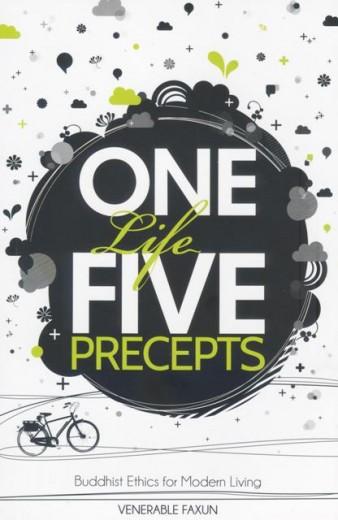Have you read a Dhamma book today?
 |
|
Read more
Have you read a Dhamma book today?
 |
|
Introduction
In this book, you will find a clear explanation of each precept and the benefits of living in accordance with it. Use your mind of wisdom and compassion to contemplate your actions so that instead of living with the motivation “I want what I want when I want it, and it doesn’t matter what I do to get it,” you live with the intention “My life depends on the kind efforts of others. Therefore I want to reciprocate their kindness by not harming them. Furthermore, because I care about myself, I want to put the seeds of positive karma, not destructive karma, in my mindstream.” Then experience the joy that comes from living an ethical life…
Read more13 July & 10 August 2012
Pustaka Nalanda’s Monthly Dhamma Discussions
‘The Great Discovery’ was the topic of the July Dhamma discussion at Nalanda Centre. The serialised monthly discussion is a Pustaka Nalanda programme aimed at bringing the Dhamma to those who want to know more about the Buddha’s teachings. Our presenter Bro. Ananda Fong skilfully guides participants in uncovering the Buddha’s ‘Great Discovery’ – the Four Noble Truths. In the 13 July session, the discussion was on the first three Noble Truths of Dukkha; the cause of Dukkha; and the end of Dukkha. The fourth Noble Truth of the path leading to the cessation of Dukkha was discussed on 10 August under the topic ‘The Path to Happiness’.
Read moreSynopsis Cittaviveka, which in Pāli means “the Mind of Non-Attachment”, is a work by Ajahn Sumedho based on his reflections of teaching Dhamma in the West. The book is divided into two parts - the first part speaks about living our lives skilfully through letting go, listening to one’s mind and understanding the five hindrances. The second part talks about the functions of the monastery to the people and society. The learning from a monastery guides people to be free from attachments, which is the source of much suffering in the world.
Read moreSynopsis Kamma and the End of Kamma is a written discourse on the diversity of kamma, how kamma came to be and how to create kamma to end the existing kamma that we have in our current lives now. In this book every known kamma in the Buddhist teachings are being investigated, its nature explained and the ways to overcome them are being taught to all readers who wish to learn more, understand more and to create kamma to end kamma. Included in this book are simple meditation manuals to further assist readers to further benefit from this discourse.
Read moreSynopsis The book contains a wonderful collection of short and illuminating essays which serve as reflections on how we see ourselves and the world. Plucking from the supreme wisdom of the Buddha, the author wrote about the relations between the human conditions and the radical psychological insights of the Buddha. Among the topics included are ‘Understanding the Bigger Picture”, ‘Caring for the World’, ‘Constructing Reality’, ‘Understanding the Teachings’, ‘The Emergence of Mindfulness’, etc. By reading the book, one will gain deeper understanding of the Dhamma as experiential tools for exploring the inner world.
Read moreSynopsis The book is a compilation of the twenty-four talks given by Ven. Ayya Khema in the spirit of the Mahāparinibbāna Sutta, and is aimed at our own practice, “having the Dhamma as our island and refuge.” The first chapter helps us to understand what it means to “take refuge” in the Buddha, Dhamma, and Sangha. The second chapter explains the sublime qualities of the Dhamma, and goes on to describe that we "need not seek other refuge." The subsequent chapters continue to introduce the teachings of the Buddha, and the sharing of the author’s meditation practice and her compassionate life that lead to inner peace.
Read moreTopic: The Three Jewels – Part 2
Date: Friday, 8 June 2012
Time: 12pm – 1.30pm
Venue: Pustaka Nalanda
Below are the Páli verses that we recite to recall the qualities of the noble Sangha:
Supatipanno Bhagavato savakasangho
Ujupatipanno Bhagavato savakasangha
Ñayapatipanno Bhagavato savakasangho
Samicipatipanno Bhagavato savakasangho
To complete the explanation of The Three Jewels, we will explore these qualities during the session on 8 June.
Synopsis This book aims at explaining why meditation is absolutely essential (it is The Only Way) to give modern men the peace and solace he so desperately needs. It details the long term and short term benefits that can be gained, how to prepare for it, the method to be used and how to evaluate success. This book is written in simple language for the benefit of those who are interested in starting this important practice, to remove their doubts and fears regarding its spiritual and therapeutic values.
Read moreAn Interactive Discussion with Dr. David R. Loy, author of “The Great Awakening - A Buddhist Social Theory” Dr. Loy began his sharing by saying that the Buddha was a great social revolutionary who advocated egalitarianism during His time in India. Regardless of caste or social status, once ordained and entered the Sangha community, one shed his/her identity and strives only for enlightenment from cycles of birth and death. To the people of India at that time, it was such a revolutionary movement and a great social awakening.
Read more
